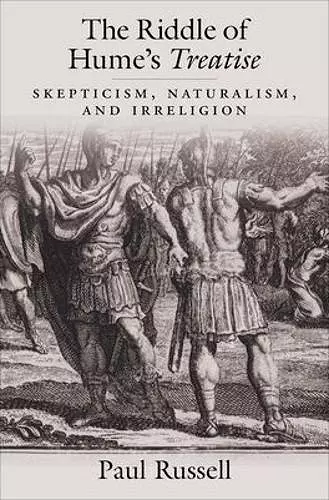The Riddle of Hume's Treatise
Skepticism, Naturalism, and Irreligion
Format:Hardback
Publisher:Oxford University Press Inc
Published:6th Mar '08
Currently unavailable, and unfortunately no date known when it will be back

Although it is widely recognized that David Hume's A Treatise of Human Nature (1739-40) belongs among the greatest works of philosophy, there is little agreement about the correct way to interpret his fundamental intentions. It is an established orthodoxy among almost all commentators that skepticism and naturalism are the two dominant themes in this work. The difficulty has been, however, that Hume's skeptical arguments and commitments appear to undermine and discredit his naturalistic ambition to contribute to "the science of man". This schism appears to leave his entire project broken-backed. The solution to this riddle depends on challenging another, closely related, point of orthodoxy: namely, that before Hume published the Treatise he removed almost all material concerned with problems of religion. Russell argues, contrary to this view, that irreligious aims and objectives are fundamental to the Treatise and account for its underlying unity and coherence. It is Hume's basic anti-Christian aims and objectives that serve to shape and direct both his skeptical and naturalistic commitments. When Hume's arguments are viewed from this perspective we can solve, not only puzzles arising from his discussion of various specific issues, we can also explain the intimate and intricate connections that hold his entire project together. This "irreligious" interpretation provides a comprehensive fresh account of the nature of Hume's fundamental aims and ambitions in the Treatise. It also presents a radically different picture of the way in which Hume's project was rooted in the debates and controversies of his own time, placing the Treatise in an irreligious or anti-Chrisitan philosophical tradition that includes Hobbes, Spinoza and freethinking followers. Considered in these terms, Hume's Treatise constitutes the crowning achievement of the Radical Enlightenment.
Paul Russell has given us a marvelously good book... [He] offers original and compelling accounts of the irreligious implications of central arguments of the Treatise on an impressive range of topics... it should never again be claimed that the Treatise is largely unconcerned with questions of religion. * Don Garrett, Philosophical Review *
This book is a triumph and a model for work in the history of philosophy. It offers a powerful reading of the Treatise and of Hume's intentions in writing it, while also correcting common misunderstandings about Hume's place in early modern thought. It deserves to be read by anyone interested in Hume or in early modern philosophy. * Colin Heydt, Journal of the History of Philosophy *
Russell's... book presents a powerful, comprehensive, and elegantly written case for putting 'irreligion' alongside - and even above - 'scepticism' and 'naturalism' as a pervasive theme not only of Hume's later work, but also of his Treatise. * Peter Millican, Faculty of Philosophy, Hertford College, Oxford University *
This is a terrific tome ... Why is this book so important? Quite simply, this is one of the best contextualist studies of Hume's A Treatise of Human Nature ever written. To elaborate a bit, this book provides a unique and fascinating interpretation of the Treatise by relating its structure and content to many of the most influential debates about religion raging at Hume's time ... one of the best books on Hume I have ever read * Kevin Meeker, Mind *
- Winner of Winner of the Journal of the History of Philosophy Prize for the Best Book on the History of Philosophy.
ISBN: 9780195110333
Dimensions: 160mm x 239mm x 36mm
Weight: 791g
448 pages